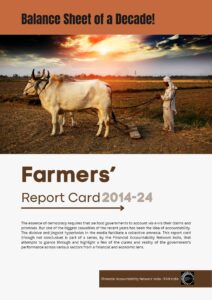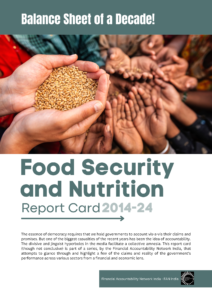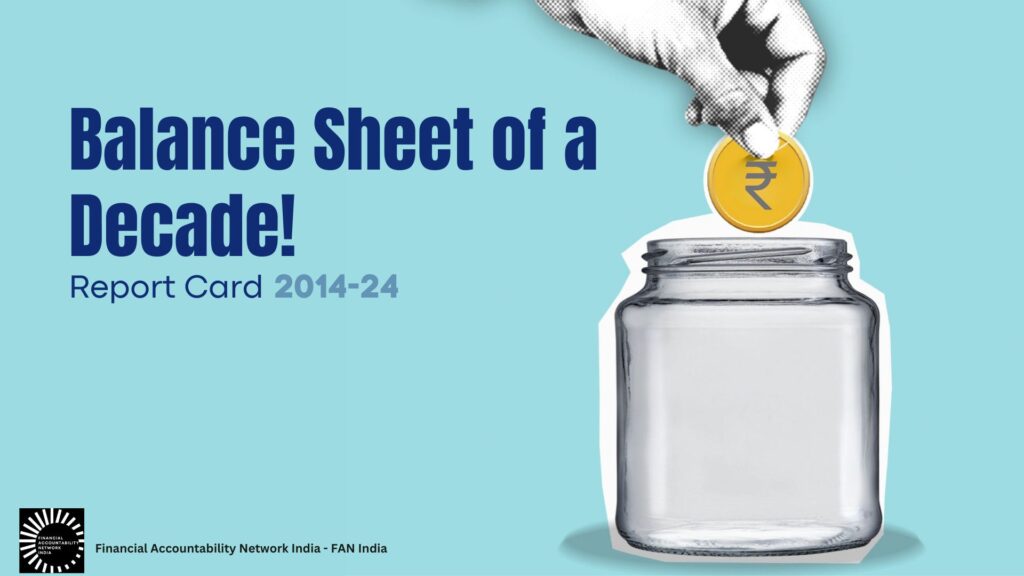
The essence of democracy requires that we hold governments to account vis-a-vis their claims and promises. But one of the biggest casualties of the recent years has been the idea of accountability. The divisive and jingoist hyperboles in the media facilitate a collective amnesia. These report cards are a part of a series called ‘Balance Sheet of a Decade,’ by the Financial Accountability Network India, that attempts to glance through and highlight a few of the claims and reality of the government’s performance across various sectors from a financial and economic lens.
Here are the report cards on its claims:
NPAs + Write Offs + Willful Defaulters | Report Card 2014-24.
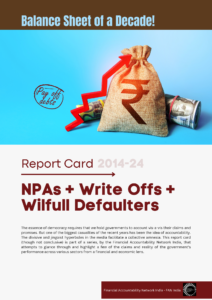 One may think how does the rising NPAs owing to bad loans to the ultra-rich affect the common people? Well, it does because it affects the availability of credit for the poor and also higher interest rates.
One may think how does the rising NPAs owing to bad loans to the ultra-rich affect the common people? Well, it does because it affects the availability of credit for the poor and also higher interest rates.
The public sector banks are made to bear the brunt of NPAs. The severity of the NPA problem was largely borne by the public sector banks. While the NPA ratio for the public sector banks remained lower than the private banks during the end of the 2000s, the former registered a phenomenal rise during the 2010s and ended up registering the NPA ratio at a level which is 6% higher than that of the private banks. So the brunt of the corporate and willful defaulters is borne by the public. The mantra being privatization of profits and nationalization of losses.
Read and Download the Report Card here: NPAs + Write Offs + Wilfull Defaulters: Report Card 2014-24
Read the Report Card in Hindi here.
Inflation | Report Card 2014 -24
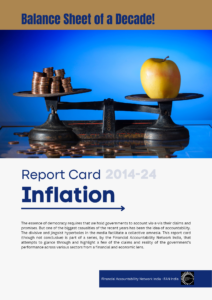 Impoverished sections who don’t have enough resources to consume even a single meal a day are hardest hit by the persistent food inflation leading to malnutrition and the country’s poor standing in the World Hunger Index. India’s rank in the Index slipped from 107 in 2022 to 111 in 2023 with a score of 28.7 which is under the serious category as per the World Hunger Index report. The percentage of the total population in India who are undernourished has increased from 14 % in 2015 to 16.6 % in 2023.
Impoverished sections who don’t have enough resources to consume even a single meal a day are hardest hit by the persistent food inflation leading to malnutrition and the country’s poor standing in the World Hunger Index. India’s rank in the Index slipped from 107 in 2022 to 111 in 2023 with a score of 28.7 which is under the serious category as per the World Hunger Index report. The percentage of the total population in India who are undernourished has increased from 14 % in 2015 to 16.6 % in 2023.
Read and Download the Report Card here: Inflation Report Card
Read the Report Card in Hindi here.
Farmer’s Report Card 2014-24
The historic farmers’ agitation against the farm Bills pushed by the Modi government was a desperate fight back against what was being touted as Indian farming’s “1991 moment”. The Bills would have made farmers directly negotiate with private corporations instead of the mediation of a state-regulated marketplace. It took about 750 deaths and a year-long militant agitation for the government to finally retreat.
The Union Ministry of Agriculture & Farmers’ Welfare had 20 schemes under it, but now only three are running. The Animal Husbandry Ministry has scrapped important schemes like Dairying through Cooperatives and National Dairy Plan-II. Now, only three out of 20 schemes — Krishonnati Yojana, the Integrated Scheme on Agricultural Cooperatives and the Rashtriya Krishi Vikas Yojana are being run by the Agriculture Ministry.
Read and download the report card here: Farmers’ Report Card 2014-24
Read the Report Card in Hindi here.
Employment | Report Card 2014-24
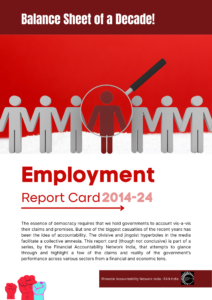 This is the fourth in a series of report cards by the Financial Accountability Network India, that attempts (even if not exhaustively) to glance through and highlight a few of the claims and reality of the government’s performance across various sectors from a financial and economic lens.
This is the fourth in a series of report cards by the Financial Accountability Network India, that attempts (even if not exhaustively) to glance through and highlight a few of the claims and reality of the government’s performance across various sectors from a financial and economic lens.
This report card deals with the many claims made about EMPLOYMENT by this government and contrasts the same with the reality on ground.
While the divisive and jingoist hyperboles in the media facilitate a collective amnesia, the report card is an attempt to brings back the question of accountability.
Read and download the report card here: Employment |Report Card 2014-24
Read the Report Card in Hindi here.
Revdis for Corporates | Report Card 2014-24
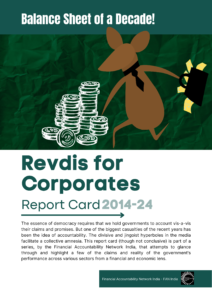 This is the fifth in a series of report cards by the Financial Accountability Network India, that attempts (even if not exhaustively) to glance through and highlight a few of the claims and reality of the government’s performance across various sectors from a financial and economic lens.
This is the fifth in a series of report cards by the Financial Accountability Network India, that attempts (even if not exhaustively) to glance through and highlight a few of the claims and reality of the government’s performance across various sectors from a financial and economic lens.
While the govt creates fuss about welfare spending calling them “freebies” and “revdi”, lakhs of crores are written off from corporate balance sheets and astronomical tax breaks are given to big business. Here is a report card on Freebies for Corporates in the last ten years.
While the divisive and jingoist hyperboles in the media facilitate a collective amnesia, the report card is an attempt to brings back the question of accountability.
Read and download the report card here: Revdi for Corporates | Report Card 2014-24
Read the Report Card in Hindi here.
Monetisation | Report Card 2014-24
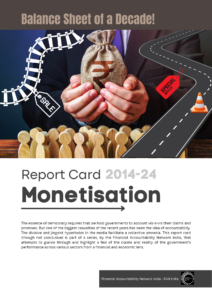 While the government has justified it in the name of raising resources for social and infrastructure spending, but the monetisation plan is nothing but one that offers chunks of the nation’s public assets for private profits.
While the government has justified it in the name of raising resources for social and infrastructure spending, but the monetisation plan is nothing but one that offers chunks of the nation’s public assets for private profits.
This is the sixth in a series of report cards by the Financial Accountability Network India, that attempts (even if not exhaustively) to glance through and highlight a few of the claims and reality of the government’s performance across various sectors from a financial and economic lens. While the divisive and jingoist hyperboles in the media facilitate a collective amnesia, the report card is an attempt to brings back the question of accountability.
Read and download the report card here: Monetisation | Report Card 2014-24
Read the Report Card in Hindi here.
IBC Haircuts | Report Card 2014-24
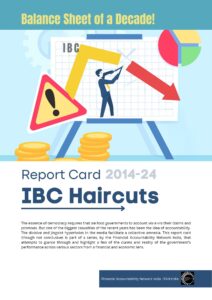 The Insolvency and Bankruptcy Code (IBC) 2016 was supposed to help in recovering mounting NPAs from the corporate sector. But over the years it has turned out to be a super salon where crores are written off in the name of haircuts and corporate sharks take over “ailing” companies for pittance. It is literally playing with pubic money.
The Insolvency and Bankruptcy Code (IBC) 2016 was supposed to help in recovering mounting NPAs from the corporate sector. But over the years it has turned out to be a super salon where crores are written off in the name of haircuts and corporate sharks take over “ailing” companies for pittance. It is literally playing with pubic money.
This is the seventh in a series of report cards by the Financial Accountability Network India, that attempts (even if not exhaustively) to glance through and highlight a few of the claims and reality of the government’s performance across various sectors from a financial and economic lens. While the divisive and jingoist hyperboles in the media facilitate a collective amnesia, the report card is an attempt to brings back the question of accountability.
Read and download the report card here: IBC Haircuts | Report Card 2014-24
Read the Report Card in Hindi here.
Taxation | Report Card 2014-24
 Why does the tax structure pinch the poor more than the rich corporates? Why is higher GST collection not necessarily a good thing for the economy? Why are the states not happy with their share in the taxes? Why was wealth tax abolished?
Why does the tax structure pinch the poor more than the rich corporates? Why is higher GST collection not necessarily a good thing for the economy? Why are the states not happy with their share in the taxes? Why was wealth tax abolished?
This is the eighth in a series of report cards by the Financial Accountability Network India, that attempts (even if not exhaustively) to glance through and highlight a few of the claims and reality of the government’s performance across various sectors from a financial and economic lens. While the divisive and jingoist hyperboles in the media facilitate a collective amnesia, the report card is an attempt to brings back the question of accountability.
Read and Download the Report Card Here: Taxation | Report Card 2014-24
Read the Report Crad in Hindi here.
Social Security and Pensions | Report Card 2014-24
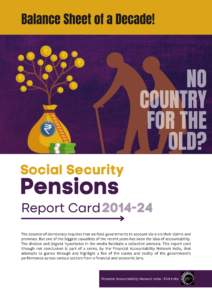 No country for the old? From pensions, to social security to old age concessions, the government frowns upon spending to take care of our elderly. A mere 300 rupees for the widows and the disabled is a joke given the prices in the bazaars. A look into our abysmal social security landscape.
No country for the old? From pensions, to social security to old age concessions, the government frowns upon spending to take care of our elderly. A mere 300 rupees for the widows and the disabled is a joke given the prices in the bazaars. A look into our abysmal social security landscape.
This is the ninth in a series of report cards by the Financial Accountability Network India, that attempts (even if not exhaustively) to glance through and highlight a few of the claims and reality of the government’s performance across various sectors from a financial and economic lens. While the divisive and jingoist hyperboles in the media facilitate a collective amnesia, the report card is an attempt to brings back the question of accountability.
Read and Download the Report Card here: Social Security and Pensions | Report Card 2014-24
Read the Report Crad in Hindi here.
Food Security and Nutrition | Report Card 2014-24
Republic of Hunger? From anaemia to stunting, from malnutrition to wasting, the numbers that should concern us do not seem to capture the media’s attention.
This is the tenth in a series of report cards by the Financial Accountability Network India, that attempts (even if not exhaustively) to glance through and highlight a few of the claims and reality of the government’s performance across various sectors from a financial and economic lens. While the divisive and jingoist hyperboles in the media facilitate a collective amnesia, the report card is an attempt to brings back the question of accountability.
Read and Download the Report Card here: Food Security & Nutrition | Report Card 2014-24
Read the Report Crad in Hindi here.
Health | Report Card 2014-24
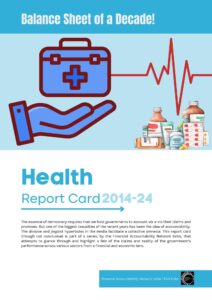 While hospital tragedies like in Nanded or Gorakhpur are briefly covered by the media, the abysmal state of health infrastructure and paltry spending on public healthcare are glossed over. There are claims of increased budgeting and lowering out of pocket expenditure, the reality is worth digging into.
While hospital tragedies like in Nanded or Gorakhpur are briefly covered by the media, the abysmal state of health infrastructure and paltry spending on public healthcare are glossed over. There are claims of increased budgeting and lowering out of pocket expenditure, the reality is worth digging into.
This is the eleventh in a series of report cards by the Financial Accountability Network India, that attempts (even if not exhaustively) to glance through and highlight a few of the claims and reality of the government’s performance across various sectors from a financial and economic lens. While the divisive and jingoist hyperboles in the media facilitate a collective amnesia, the report card is an attempt to brings back the question of accountability.
Read and Download the Report Card here: Health | Report Card 2014-24]
Read the Report Crad in Hindi here.
Education | Report Card 2014-24
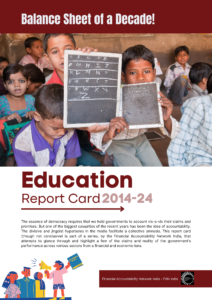 In terms of spending on infrastructure, privatisation, huge vacancies and changes in curriculum – the assault on education is from many directions. What is at stake is our future generations.
In terms of spending on infrastructure, privatisation, huge vacancies and changes in curriculum – the assault on education is from many directions. What is at stake is our future generations.
This is the twelfth in a series of report cards by the Financial Accountability Network India, that attempts (even if not exhaustively) to glance through and highlight a few of the claims and reality of the government’s performance across various sectors from a financial and economic lens. While the divisive and jingoist hyperboles in the media facilitate a collective amnesia, the report card is an attempt to brings back the question of accountability.
Read and download the report card here: Education | Report Card 2014-24
Transportation | Report Card 2014-24
 From handing over the ports & airports to corporates to the discrepancies in highway construction costs. From the duopoly in the skies to premium tatkals and Vande Bharats in railway. Transport infra is being sold off and made unaffordable for the poor.
From handing over the ports & airports to corporates to the discrepancies in highway construction costs. From the duopoly in the skies to premium tatkals and Vande Bharats in railway. Transport infra is being sold off and made unaffordable for the poor.
This longish report is the thirteenth in a series of report cards by the Financial Accountability Network India, that attempts (even if not exhaustively) to glance through and highlight a few of the claims and reality of the government’s performance across various sectors from a financial and economic lens. While the divisive and jingoist hyperboles in the media facilitate a collective amnesia, the report card is an attempt to brings back the question of accountability.
Read and Download the Report Card here: Report Card on Transport 2014-24

